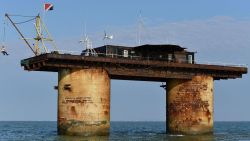Principality of Sealand: Difference between revisions
Created page with "{{Infobox country | conventional_long_name = Principality of Sealand | native_name = Sealand | image_flag = Flag of Sealand.svg | image_coat = Coat of arms of Sealand.svg | symbol_width = 120px | motto = ''E Mare Libertas''<br /><small>From the Sea, Freedom</small> | anthem = ''E Mare Libertas'' | image_map = Sealand_location.png | map_caption = Location of Sealand in th..." |
No edit summary |
||
| Line 43: | Line 43: | ||
== History == | == History == | ||
[[File:Sealand_fort.jpg|thumb | [[File:Sealand_fort.jpg|thumb|250px|HM Fort Roughs in 2017]] | ||
In 1966, Paddy Roy Bates, a former British Army major and pirate-radio broadcaster, occupied the abandoned Roughs Tower to operate Radio Essex. After legal troubles with British authorities, he declared the platform independent on 2 September 1967, proclaiming himself Prince Roy I and his wife Joan as Princess Joan. | In 1966, Paddy Roy Bates, a former British Army major and pirate-radio broadcaster, occupied the abandoned Roughs Tower to operate Radio Essex. After legal troubles with British authorities, he declared the platform independent on 2 September 1967, proclaiming himself Prince Roy I and his wife Joan as Princess Joan. | ||
Revision as of 00:32, 19 November 2025
The Principality of Sealand is a micronation located on HM Fort Roughs, a former World War II Maunsell Sea Fort situated in the North Sea approximately 12 kilometres (7.5 mi) off the coast of Suffolk, England. Proclaimed on 2 September 1967 by Paddy Roy Bates, it is the oldest and most famous micronation still in existence.
Sealand claims to be a sovereign state but is not recognised as such by any UN member state.
History

In 1966, Paddy Roy Bates, a former British Army major and pirate-radio broadcaster, occupied the abandoned Roughs Tower to operate Radio Essex. After legal troubles with British authorities, he declared the platform independent on 2 September 1967, proclaiming himself Prince Roy I and his wife Joan as Princess Joan.
In 1968, the British Royal Navy attempted to evict the Bates family. When approached, Michael Bates fired warning shots, leading to the famous “Sealand invasion trial” (R v. Bates, 1968), in which a British court ruled it had no jurisdiction because the fort lay outside UK territorial waters at the time. This remains Sealand’s primary legal argument for independence.
In 1978, while Roy and Joan were in England, a German-Dutch group led by Alexander Achenbach staged a coup, taking Prince Michael hostage. Roy and Michael counter-attacked by helicopter and retook the platform, holding the invaders as prisoners of war. This is the only armed conflict in Sealand’s history.
Government and politics
Sealand operates as an absolute monarchy that has gradually transitioned toward a constitutional model. Prince Michael Bates has ruled since his father’s death in 2012.
Sealand issues its own passports (mostly honorary), coins, stamps, and titles of nobility. Between 1998 and 2006 it briefly hosted HavenCo, an offshore data-haven company.
Geography
Sealand consists of a single platform (Roughs Tower) with a surface area of approximately 4,000 m². It stands on two concrete legs in the Thames Estuary.
Economy
Revenue comes primarily from:
- Sale of noble titles (Lord, Lady, Baron, etc.)
- Merchandise and coins
- Occasional media and film licensing
Recognition
Sealand has received limited diplomatic recognition from other micronations and has mutual recognition agreements with several, including the Republic of Molossia and the Grand Duchy of Flandrensis. No UN member state recognises Sealand as sovereign.
In popular culture
Sealand has appeared in numerous documentaries, television shows, and films. It remains the iconic symbol of micronationalism worldwide.
